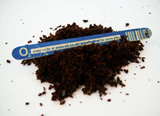
Billed as Europe's first "personalised paper", "niiu", a newspaper tailored to readers' individual wishes and delivered to their door before 08:00 am, made its first appearance in Berlin on Monday.
Customers of the paper choose what topics they want to read about -- be it sport, politics, fashion or any from a wide choice -- and receive news only on their chosen subject collated together and delivered like any other paper.
Articles are pulled together from major German papers such as Handelsblatt, Bild and Tagesspiegel, foreign titles such as the International Herald Tribune or the New York Times, as well as major blogs and Internet news sources.
For the right to print their news, "niiu" pays a licence to these papers, which in turn reach a younger audience, as "niiu" is aimed mainly at students, who pay 1.20 euros (1.79 dollars) to get their news fix. Non students are expected to stump up 1.80 euros.
The two German entrepreneurs who came up with the idea were delighted with their first day in business, having launched the concept in mid-October. More than 1,000 people have already signed up on the Internet to receive the "niiu", said Wanja Oberhof, 23, one of the founders. "That has exceeded all our expectations," he told AFP. "It's not just students, the interest is much wider," he added. The pair hopes to be printing 5,000 copies in the next six months, first in Berlin before rolling it out nationwide.
At a time when newspapers globally are struggling with competition from Internet news sources, the founders acknowledge that "niiu" is a risky venture. However, they said that young people were tired of trawling the web for news and would pay for the tailored service their paper offers. Eventually, clients will be able to choose the length of the paper delivered -- for example, eight pages on a busy Monday morning but 60 pages on a Friday when there might be more time to read. Initially, however, the paper consists of 16 pages.
Read more at: http://forum4editors.com/2009/10/a-brand-niuu-day-for-the-printed-newspapers-is-coming/
http://www.dw-world.de/dw/article/0,,4899459,00.html?maca=en-rss-en-all-1573-rdf









